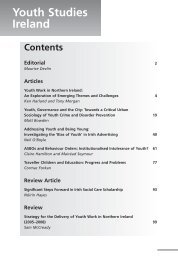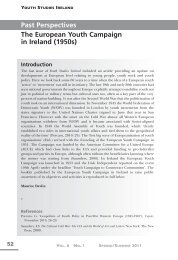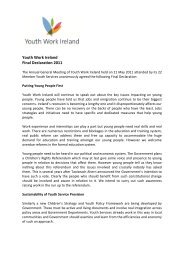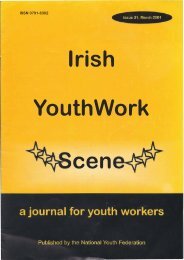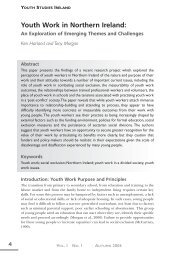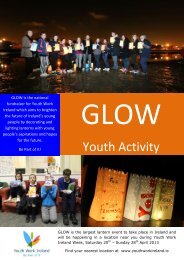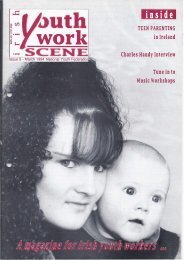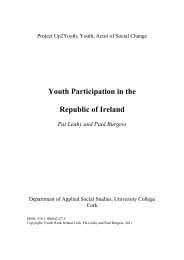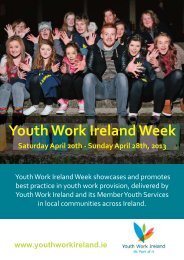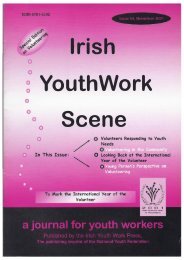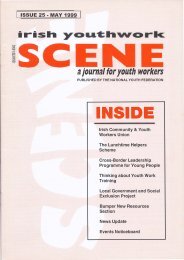Voices of Hidden Young Carers in Cork, Joe Finnerty and Cathal O ...
Voices of Hidden Young Carers in Cork, Joe Finnerty and Cathal O ...
Voices of Hidden Young Carers in Cork, Joe Finnerty and Cathal O ...
You also want an ePaper? Increase the reach of your titles
YUMPU automatically turns print PDFs into web optimized ePapers that Google loves.
<strong>Voices</strong> <strong>of</strong> <strong>Hidden</strong> <strong>Young</strong> <strong>Carers</strong> <strong>in</strong> <strong>Cork</strong>fulfill<strong>in</strong>g dist<strong>in</strong>ct family <strong>and</strong> social roles, <strong>in</strong>clud<strong>in</strong>g be<strong>in</strong>g the ma<strong>in</strong> providers <strong>of</strong> care <strong>in</strong>the community. The social perspective on disability is primarily concerned with the rights<strong>and</strong> needs <strong>of</strong> disabled people <strong>and</strong> their experiences <strong>of</strong> ‘disabl<strong>in</strong>g barriers’ <strong>in</strong>clud<strong>in</strong>gdiscrim<strong>in</strong>ation <strong>and</strong> exclusion. Becker et al. (1998) identify what they term a ‘subliterature’<strong>of</strong> the social perspective on disability, which has challenged the ma<strong>in</strong>streamwork on young carers <strong>and</strong> has focused <strong>in</strong>stead on the rights <strong>and</strong> needs <strong>of</strong> those whohave physical or mental impairments (Keith <strong>and</strong> Morris, 1995; Parker <strong>and</strong> Olsen,1995; Newman, 2002). F<strong>in</strong>ally the family perspective has grown out <strong>of</strong> the debatebetween the rights <strong>of</strong> disabled people <strong>and</strong> the rights <strong>of</strong> children who care, emphasis<strong>in</strong>gprevention <strong>in</strong> a ‘whole family’ context as opposed to protection (Becker et al., 1998).Due to the complexity <strong>and</strong> diversity surround<strong>in</strong>g the role <strong>of</strong> young carers, asatisfactory def<strong>in</strong>ition has proved difficult to arrive at. Several def<strong>in</strong>itions <strong>of</strong> youngcarers can be identified with<strong>in</strong> the literature on social work <strong>and</strong> from car<strong>in</strong>gorganisations. A range <strong>of</strong> factors can be cited which set young carers apart from bothadult carers <strong>and</strong> other young children with<strong>in</strong> families <strong>and</strong> households who do not takeon a car<strong>in</strong>g role. Aldridge <strong>and</strong> Becker (1997) suggest the follow<strong>in</strong>g def<strong>in</strong>ition:A child or young person (under 18) who is carry<strong>in</strong>g out significant car<strong>in</strong>gtasks <strong>and</strong> assum<strong>in</strong>g a level <strong>of</strong> responsibility for another which would usuallybe undertaken by an adult.Research on <strong>Young</strong> <strong>Carers</strong> <strong>in</strong> Irel<strong>and</strong>There is little by way <strong>of</strong> a young carer research literature <strong>in</strong> Irel<strong>and</strong>, with exist<strong>in</strong>gresearch overwhelm<strong>in</strong>gly focus<strong>in</strong>g on adult caregivers (see for example O’Donovan etal., 1997; Garavan et al., 2001). While Halpenny <strong>and</strong> Gilligan (2004) have undertakena wide-rang<strong>in</strong>g literature review on young carers which surveyed the <strong>in</strong>ternationalliterature <strong>and</strong> policy context, they did not undertake any primary research withhidden young carers.Two short studies which made references to young carers were carried out <strong>in</strong> themid-1990s. The first was by Multiple Sclerosis Irel<strong>and</strong> (1996) on MS sufferers <strong>and</strong> thesecond was a pilot study by <strong>Carers</strong> Association (Irel<strong>and</strong>) (1997) which aimed to obta<strong>in</strong>an overall picture <strong>of</strong> the contexts with<strong>in</strong> which young people were provid<strong>in</strong>g care. TheMS Irel<strong>and</strong> study was focused on care needs <strong>of</strong> sufferers <strong>of</strong> that condition <strong>and</strong> thesource <strong>of</strong> the care they received while the <strong>Carers</strong> Association research focused on thenature <strong>of</strong> the tasks <strong>and</strong> extent <strong>of</strong> car<strong>in</strong>g undertaken by young people rather thanexplor<strong>in</strong>g the impacts on young carers <strong>and</strong> their attitudes <strong>and</strong> feel<strong>in</strong>gs <strong>in</strong> relation totheir car<strong>in</strong>g responsibilities.Policy <strong>and</strong> Provision <strong>in</strong> Irel<strong>and</strong>In the Irish context, recognition <strong>and</strong> responses to the existence <strong>and</strong> needs <strong>of</strong> youngcarers could be best described as uneven. No national policy strategy exists with anexplicit focus on young carers, <strong>and</strong> no reference to young carers is made <strong>in</strong> either theNational Children’s Strategy 2000–2010 or the Office for Social Inclusion (2007)publication A Social Portrait <strong>of</strong> Children <strong>in</strong> Irel<strong>and</strong>. Additionally, there is a noteworthyabsence <strong>of</strong> mention <strong>of</strong> the ‘young carer’ issue <strong>in</strong> the Comhairle document Support<strong>in</strong>g<strong>Carers</strong> (2002), or <strong>in</strong> the Jo<strong>in</strong>t Oireachtas Report on the Position <strong>of</strong> Full-Time <strong>Carers</strong> (2003).15



